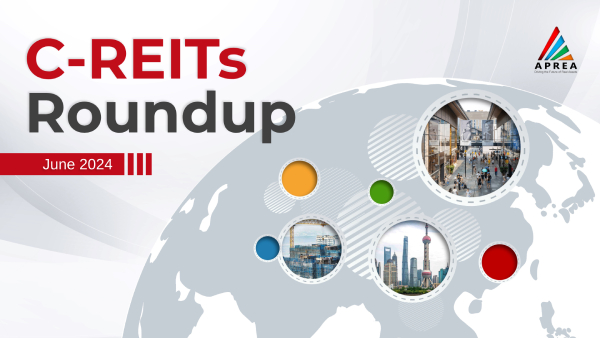
Stay ahead of the curve with APREA's exclusive monthly update tracking the performance of China REITs.
APREA C-REITs Roundup provides the latest info and developments in C-REITs. Available for APREA members only, this important resource is your key to navigating the landscape of C-REITs.
Download the Report (English) Download the Report (Chinese)
Read MoreAsian Real Estate Securities continue to oscillate in 2024 as rates expectations drive performance of REITs, Developers, and Asian currencies. One positive note is that globally fund managers are said to be the most underweight the real estate sector they have been since 2009, a year when entering the sector delivered several consecutive years of strong absolute and relative performance. Despite increases in yields and hawkish comments from Fed officials, the corrections have been shallow and on low volumes. MSCI changes which resulted in the deletion of several Asian REITs from their index had been an overhang and that was removed at month-end, enabling us to potentially see some improvements after well-flagged deletions led to underperformance as passive funds were sellers. We added to positions that were impacted as a result of these changes. Sentiment in the near term will likely be dictated by US employment data to be released at the end of the first week of June. Last month’s report showed an increase in the unemployment rate so any continuation of this trend may shift rate expectations yet again which would be positive for Asian REITs and currencies. Large discretionary consumer companies in the US have noted that lower-income consumers have been notably weaker, possibly as pandemic savings have been run down and higher costs crimp disposable income. Results and guidance behind us, the drivers for REITs and Developers are likely to be macro, but we could also start to see some uptick in corporate activity and buyback announcements.
Download the Report Read MoreThe Inclusive Cities Barometer evaluates the inclusiveness of 44 EMEA cities and 35 APAC cities, based on just under 9,000 data points, 110 metrics across 4 dimensions and 12 subdimensions.
The cities represented in the Barometer are at varying stages of their journey towards more inclusive and vibrant urban environments. Instead of ranking cities by performance, our Barometer measures their progress relative to these starting points, highlighting exemplary successes and providing actionable roadmap for improvement.
Through the Inclusive Cities Barometer, we aim to guide and inspire real estate industry stakeholders towards creating more inclusive and socially sustainable urban environments. Access the hub to find out:
CBRE’s latest leasing market sentiment index reveals that leasing sentiment in most major Asia Pacific markets cooled but stayed in positive territory:
Please find below the rebalancing results (effective 24 June 2024 start of trading) for the: